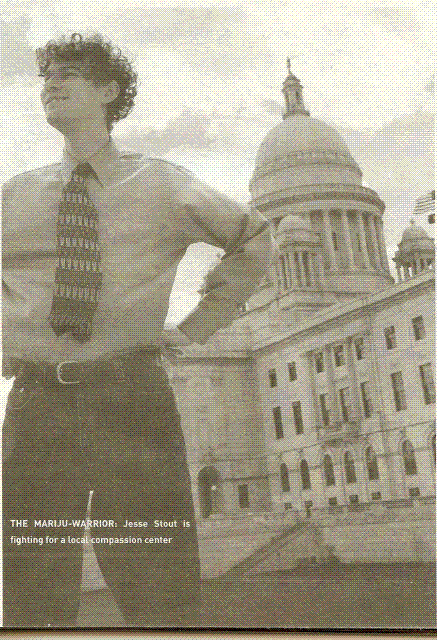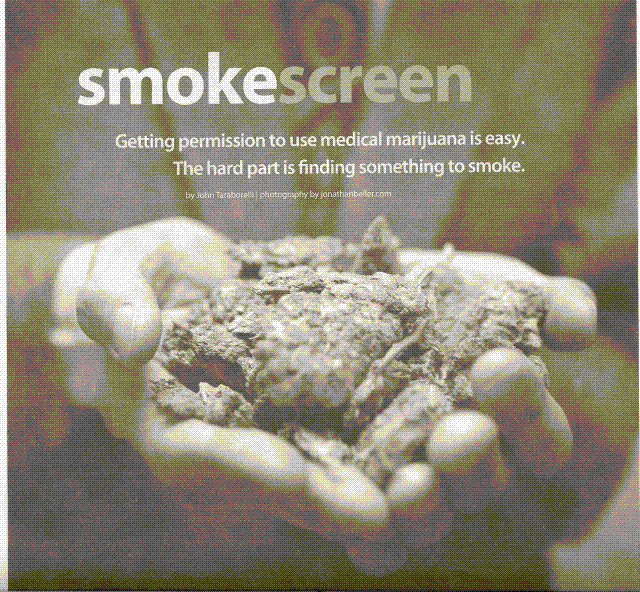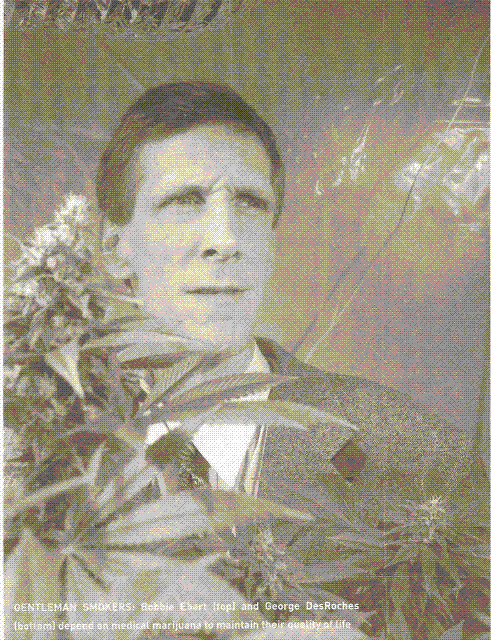PROVIDENCE MONTHLY magazine
Searching for Relief
by John Taraborelli
With the vote last year to override the governor's veto and repeal the sunset clause in Rhode Island's Medical Marijuana Act, our state was finally made safe for patients with illnesses ranging from cancer to glaucoma to chronic pain to access cannabis for treatment of their conditions. In theory.
Legally, George DesRoches, who turned to marijuana for relief from both the chronic pain of back and knee injuries and the debilitating, nausea-inducing effects of traditional painkillers, can possess up to twelve plants and 2.5 ounces of usable marijuana. He can also appoint a caregiver to grow those plants for him and supply him with marijuana. However, should those options fail him, he has no legal way of procuring what for him has become an indispensable medicine.
“Sitting on a dark street waiting for some guy you met four hours ago to come out of some house down in South Providence and seeing a cop behind you,” recalls DesRoches, “you think about these things.”
As with many good things in life, the Medical Marijuana Act came with a catch: access. Although it is legal for these patients to grow, possess, and use marijuana, no system is in place for them to purchase it. For some, like DesRoches, growing it is not an option. According to the law, patients must grow their marijuana indoors, but he lives in subsidized housing where this kind of horticultural operation is not permitted. Even appointing someone to grow it for him is easier said than done. Beyond the difficulty of finding a trustworthy and reliable caregiver, there is the problem of finding one capable of growing marijuana. The cultivation of the cannabis sativa plant from which it is derived is not like planting some basil in the garden. Not just any backyard greenthumb can produce a usable cannabis crop; it requires a steady, studied hand to guide the plant through various stages of development. Furthermore, growing it indoors requires expensive lighting and other equipment to simulate a more hospitable environment than a garage or basement. Of course, even if one can afford to go down to the local gardening store to buy such equipment, it's not as if the store sells seeds to go with it. Several sources in Canada offer mail order seeds, but there's always the risk that they'll be confiscated in transit, as a Rhode Island-issued medical marijuana card does nothing to circumvent the federal prohibition on the substance. So how is someone like George DesRoches supposed to reap the benefits of this groundbreaking law?
“I survive a lot on the kindness of others,” he says. “Every once in a while I'll make a major purchase so I can get it within my price range, but I have to save up for that. And I've gotten burned in those major purchases before.”
This is quite a predicament for many chronically ill patients, who find marijuana more effective than anything they can get from a pharmacy. Jesse Stout, executive director of the Rhode Island Patient Advocacy Coalition (RIPAC), the lobbying organization that fought for the Medical Marijuana Act, is not content to let these people languish in a legal gray area. The repeal of the sunset clause was the last obstacle to making medical marijuana a permanent reality in the Ocean State, but still his work is not done. His next, and perhaps final, act as a lobbyist is the Compassion Center Bill, which would direct the Department of Health to license and regulate a nonprofit distribution center, providing patients with a safe and reliable source of quality, affordable marijuana.
According to Stout, under the law as it stands “patients are really left on their own, despite whatever debilitating disease got them here in the first place. This (compassion center) will be not only more safe and secure, but more convenient, more accessible.”
The bill seems to have broad support. The General Assembly has twice proved itself willing to override the governor's veto in favor of medical marijuana, first to legalize the program, then to make it permanent. The Rhode Island Medical Society (RIMS) has also been a strong supporter of RIPAC's efforts. Steven DeToy, the Director of Public and Government Affairs for RIMS, agrees that access has “always been a weakness in our statute. So this compassion center addresses that issue. It addresses quality issues. It addresses oversight. RIPAC has done a good job of plugging the last hole and making sure patients have access to a product that may help them”Even previous opponents of medical marijuana, like the state police, have chosen to stand neutral on the Compassion Center Bill. Stout has spoken to a police spokesman, and found that patient access was a major sticking point from a law enforcement point of view.
“He said it was the issue of distribution,” Stout recalls, “that patient access would be through the black market, and they would never want to see more money going to the illicit drug economy.”
In fact, the only major opponent remaining is Governor Carcieri, who has twice used the veto power against medical marijuana.
“It wasn't a surprise to us that the governor was opposed to this,” claims DeToy. “It really demonstrates the fact that he and his staff have not done the kind of research that we've done to look at the evidence that's out there.”
Indeed, the anecdotal evidence is abundant, and unquestionably favors medical marijuana. I say anecdotal evidence, because the federal government continues to block any effort to extensively study the efficacy of the substance. In a typically farcical display of bureaucratic schizophrenia, the government maintains a farm in Mississippi where crops are grown for the largely defunct federal medical marijuana program, but they remain off limits to scientists and researchers. “Not only has the federal government refused to do their own testing,” DeToy protests, “they have refused to supply any other researchers with the marijuana that they grow there.”
Despite the lack of official documentary evidence, patients and doctors across Rhode Island agree that the benefits of the Medical Marijuana Act have been undeniable. For George DesRoches, it has not only dulled his pain, but allowed him to gain back some of the sixty pounds he lost as a result of the havoc that more textbook treatments wreak on the digestive system. For him, the decision to turn to marijuana was a last resort suggested by his doctor.
“My doctor actually came to me,” he recounts. “We've tried several different batteries of opiates, etc. We've tried pain clinics. We've tried change of diet, change of behavior. I upgraded my bed. I did all these things and I wasn't getting any better.”
Another patient whose quality of life has been dramatically enhanced by medical marijuana is Bobbie Ebert, who is AIDS/HIV positive and suffers from a bad back. Prior to marijuana, his only source of relief was from opiates like morphine and fentanyl, which can be both devastating in their efforts to dull pain and highly addictive.
“The side effects from the other drugs are so unbelievable,” says Ebert. “I was a mean person. I wasn't myself. It changes your disposition.”
Contrary to the misguided “War on Drugs” argument that marijuana is a “gateway drug” leading to harder substances, Ebert was able to wean himself off heavy opiates, derived from the same source as street level heroin, with the help of marijuana, and return to a more normal, functional existence.
“I've got a sense of a life right now,” he proudly declares, “other than laying down on the couch sleeping.”
Ebert has traversed the spectrum of good and bad experiences in his efforts to procure marijuana. Like many of the patients in the program, he has his share of horror stories about stooping down to the street level for a purchase.
“I was down in the city one day,” he tells me. “I gave my money to the kid, and about four other kids came out and beat me up and ran off. What are you going to do, call the police and tell them you're trying to make a drug deal to get your medicine?”
DesRoches too has has gone through the ordeal of black market buys, and several times found himself on the business end of a gun, courtesy of both hoodlums looking to rob him, and police unaware of the medical marijuana card in his pocket. Anyone who has ever bought marijuana before (and let's be honest, that's a lot of people) surely realizes that even the most friendly, harmless, reliable dealer is not someone to be entrusted with the wellbeing of a terminally ill patient.
Even for more fortunate patients like Ebert, who now has a caregiver to grow his marijuana, the compassion center would be a boon. It typically takes three months for his plants to yield a two-to-three week supply. A compassion center would fill in those gaps. It would also help stabilize the quality of marijuana available. While horticulture is a science, it's not an exact one, and the marijuana from one crop might not be as effective as that of another. By trusting the cultivation to a professional organization instead of a handful of good Samaritans, patients will be able to access this medicine with the same reliability and certainty of a pharmacy.
Patients like Bobbie Ebert and George DesRoches are heavily invested in the idea of a compassion center, and they are willing to work for it. Ebert, in particular has testified in its favor, given interviews to various media sources, and even questioned Republican presidential candidate John McCain about the issue at a town hall meeting in New Hampshire. Medical marijuana has become an essential tool for these folks to get through life, and they take their access to it very seriously. At one point in our interview, DesRoches referred to marijuana as “pot” in a slip of the tongue, and went out of his way to correct the error. For him “pot” is something college students do for fun; marijuana is a medicine.
The patients served by RIPAC have become a community and support system where they can share advice, wisdom, and sometimes the fruits of their labor. When I reached DesRoches by phone, Ebert and two caregivers were also at his home. And they encourage curious citizens, whether supporters or critics of the program, to join them at their monthly meetings.
“People from the community are welcome to come in and ask questions, listen to what's going on, listen to what these people talk about,” explains DesRoches, “so they can learn what the real story is, and not trust hearsay, or what you read in the paper and what you see on the news. It allows people to get a more personal viewpoint on it.”
If all goes according to plan, a compassion center should be up and running in about a year, and in two years, Stout envisions a maximum of three operating within the state. Rhode Island was only the eleventh state to legalize medical marijuana, and it is poised to become the only one with an official distribution center.
“Our bill, if passed this year, could serve to some degree as a model for how to regulate the distribution of medical marijuana,” Stout explains. “Rhode Island would be the first state to do so.”
This would be a bold move in asserting states' rights over the wishes of federal government, and a groundbreaking step in the effective, compassionate treatment of chronic suffering. Patients like Bobbie Ebert could live out their days with something like a normal life, and crawl out from under the shadow of traditional opiates.
“It's sad to see that morphine is actually legal,” he laments, “when that drug is derived from heroin, which is illegal. Somewhere along the lines, somebody screwed up. They made the wrong drugs legal.”




